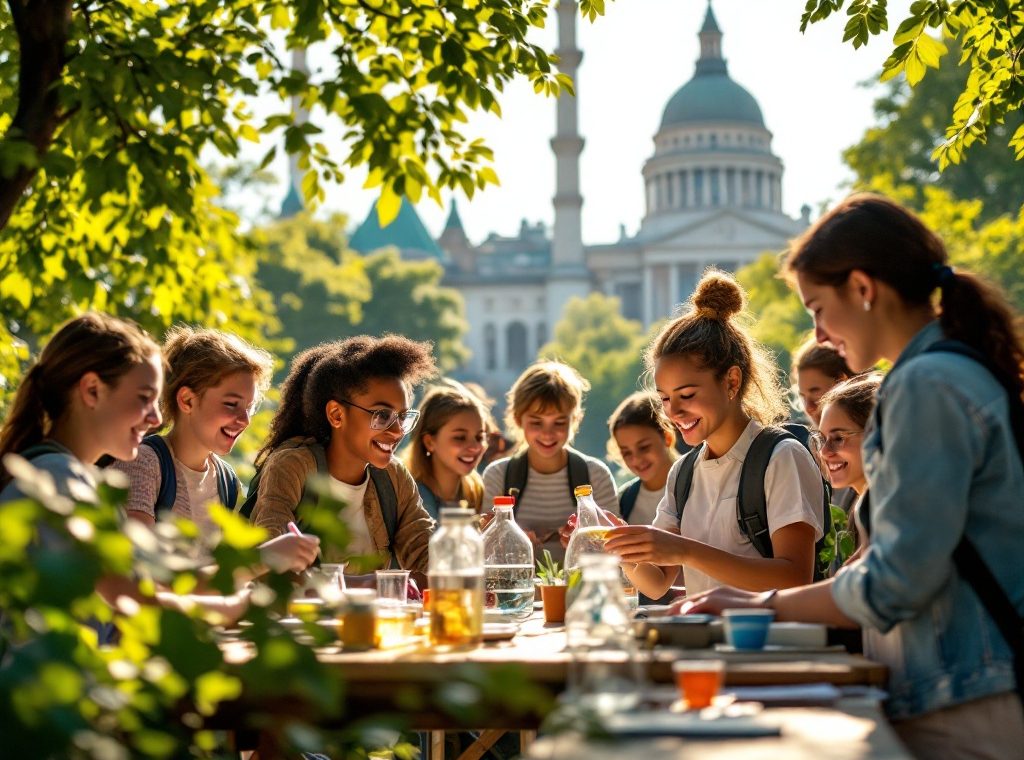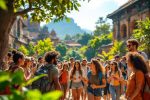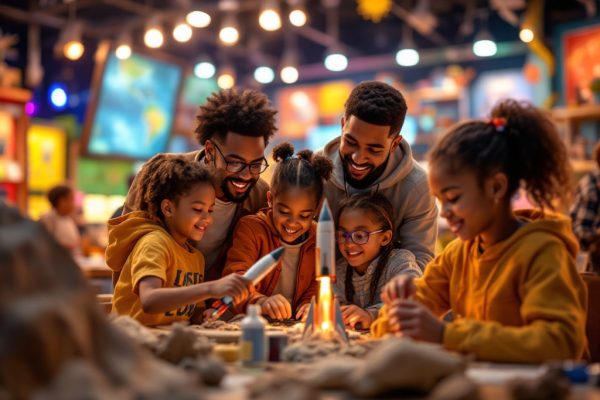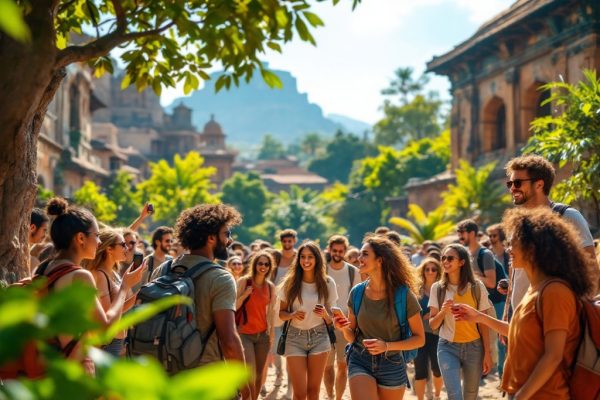Educational Tours: Learning and Adventures
Want to transform learning into an unforgettable adventure? Educational tours offer immersive experiences that bring classroom subjects to life, from exploring historical sites to conducting science experiments in nature. Discover how these hands-on adventures boost knowledge retention, critical thinking, and social skills while creating lasting memories. Dive in to explore the world of educational travel and unlock the transformative power of learning beyond the classroom.
Important information
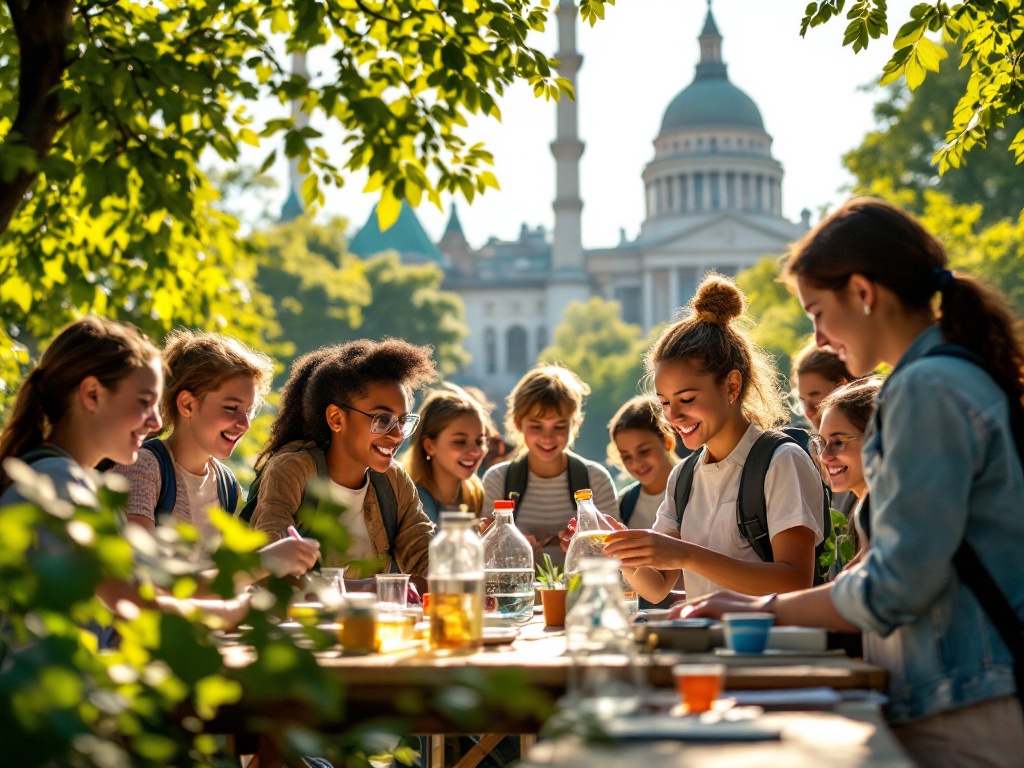
- Educational tours offer hands-on learning experiences, connecting classroom subjects to the real world.
- These tours boost academic performance through deeper understanding and improved knowledge retention.
- Students develop essential life skills like adaptability, critical thinking, and communication through navigating new environments and interacting with diverse people.
- Experiences outside the classroom strengthen student-teacher relationships and foster personal growth.
- Choosing a reputable tour company with a strong safety record, experience, and educational value is crucial for a successful tour.
Educational Tours: Learning and Adventures
Educational tours transform learning into an adventure, offering immersive experiences beyond the classroom. Students explore diverse subjects like history, science, and art through guided excursions that bring their studies to life. Specialists lead interactive workshops and live demonstrations, enhancing comprehension.
Benefits of Educational Tours
- Deeper understanding: Hands-on experiences foster a more profound comprehension of subjects.
- Improved knowledge retention: Interactive learning makes information more memorable.
- Engaging learning experience: Tours transform learning into an exciting adventure.
Example Activities
- Visiting historical sites, bringing history to life.
- Conducting experiments in nature, fostering scientific inquiry.
- Exploring renowned art museums, inspiring creativity.
How Educational Tours Combine Learning with Adventure
Educational tours transform learning into a vibrant experience. Students explore and discover, connecting classroom subjects to the real world, fostering deeper understanding. These adventures blend education and excitement, creating immersive learning opportunities that enrich students with valuable, firsthand experiences.
Breaking Down Classroom Walls through Real-Life Experiences
Educational tours transform classroom lessons into dynamic real-world experiences. Students witness their subjects firsthand, turning abstract concepts into tangible realities. Imagine a history lesson coming alive at an actual historical site! Furthermore, students actively engage with their environment, fostering deeper understanding and creating lasting memories. These immersive experiences nurture personal growth and boost academic performance. Educational tours offer a powerful path to holistic development.
Benefits of Educational Tours
- Transforms abstract concepts into tangible realities.
- Provides firsthand experience with the subject matter.
- Creates lasting memories and deeper understanding.
Impact of Educational Tours
- Fosters active engagement with the environment.
- Nurtures personal growth and boosts academic performance.
- Offers a path to holistic development.
Benefits of Educational Tours for Students
Educational tours offer incredible benefits for students, enhancing learning through real-world experiences that lead to deeper understanding and improved information retention. Exposure to diverse cultures broadens their horizons, introducing them to new perspectives. Navigating new environments and interacting with different people develops critical thinking and social skills. These tours foster curiosity and encourage teamwork while providing a refreshing break from traditional classrooms, making learning both engaging and fun. Students gain confidence and independence, creating lasting memories.
- Real-world learning: Educational tours transform textbook knowledge into tangible experiences, leading to a deeper understanding of subjects and better information retention.
- Cultural exposure: Experiencing different cultures firsthand broadens students’ perspectives and promotes appreciation for diversity.
- Enhanced social skills: Navigating unfamiliar environments and interacting with diverse groups of people develops valuable social and communication skills.
- Developing critical thinking: Tours challenge students to adapt, solve problems, and think critically in real-time situations.
- Boosting curiosity and teamwork: The excitement of exploration and shared experiences nurtures curiosity and encourages collaboration among students.
- Engaging learning experience: Tours offer a refreshing break from traditional classroom settings, making learning fun and memorable.
- Building confidence and independence: Stepping outside their comfort zones empowers students with increased confidence and independence.
Personal Growth and Education Beyond the Classroom
Educational tours empower students by cultivating independence and adaptability. They hone problem-solving skills and extend learning beyond textbooks, allowing students to experience the world directly. Cultural immersion fosters deeper understanding, while interacting with diverse communities broadens perspectives. These journeys also offer invaluable life lessons. Key benefits of educational tours include fostering deeper understanding through cultural immersion, broadening perspectives by interacting with diverse communities, and offering invaluable life lessons. Students develop independence and adaptability, hone problem-solving skills, and extend learning beyond textbooks.
Development of Life Skills through Student Travel
Student travel fosters essential life skills. Navigating unfamiliar environments and making independent decisions cultivates self-reliance. Interacting with diverse individuals hones communication skills. Unexpected challenges, such as a missed train or language barrier, enhance problem-solving abilities and encourage quick thinking. These experiences build valuable skills applicable to various aspects of life, empowering students for future success.
Types of Educational Tours and Programs
Educational tours and programs offer diverse learning experiences. Expert-led guided tours feature hands-on workshops and insightful perspectives. Student travel programs immerse participants in new cultures, fostering personal growth and enhancing learning. By blending curriculum with adventure, these programs create unique opportunities for students to explore historical sites, engage in cultural exchanges, or even embark on scientific explorations. These experiences broaden perspectives and deepen understanding of the world.
Educational Tours
Expert-led guided tours offer hands-on workshops and insightful perspectives, blending curriculum with adventure.
- Explore historical sites,
- Engage in cultural exchanges,
- Embark on scientific explorations.
Student Travel Programs
Student travel programs immerse participants in new cultures, fostering personal growth and enhancing learning.
- Broaden perspectives,
- Deepen understanding of the world,
- Create unique learning opportunities.
Guided Tours and Workshops with Industry Professionals
Expert-led guided tours offer structured learning and valuable insights. Workshops with industry professionals provide hands-on activities, allowing students to develop practical skills and gain real-world perspectives through direct interaction. These experiences often include demonstrations and interactive sessions, giving students behind-the-scenes access to observe industry practices firsthand and learn about their chosen fields. Students benefit from:
- structured learning during guided tours,
- hands-on skill development in workshops,
- real-world insights from industry experts.
Student Travel Programs and Their Impact on Learning
Student travel programs transform learning by connecting classroom lessons with real-world experiences. Immersing students in their subjects firsthand reinforces concepts and deepens understanding, boosting critical thinking and knowledge retention. For example, history students visiting historical sites witness history firsthand. Science students exploring research facilities gain insights into scientific work. These experiences turn passive learners into active participants, making learning more engaging and impactful. Furthermore, navigating new environments and cultures fosters adaptability, independence, and valuable life skills. While cost can be a barrier, scholarships and fundraising can help make these invaluable educational opportunities accessible.
Planning and Coordinating Educational Tours
Select destinations that align with the curriculum.
Establish a comprehensive budget that includes transportation and lodging costs.
Manage logistics efficiently.
Choose reputable tour operators who prioritize student safety.
Plan the trip thoroughly.
These steps create a profound learning experience and a successful trip where students gain invaluable knowledge and skills, including cultural understanding and enhanced problem-solving abilities. These tours also foster personal development, such as increased independence and adaptability.
Choosing the Best Educational Tour Companies
Planning an educational tour requires careful selection of the right company. While cost and logistics matter, prioritize experience, reputation, and a solid safety record. A well-crafted itinerary should offer genuine educational value, comfortable accommodations, and dependable transportation are essential for a smooth and enriching experience. Compare prices and inclusions to maximize your budget. Client reviews offer valuable insights, so read them carefully. Look for certifications that demonstrate a commitment to quality. A reputable company will enhance your students’ learning experience. Choose wisely for a truly impactful tour.
Key Factors for Choosing an Educational Tour Company
- Experience and Reputation: prioritize companies with a proven track record of successful educational tours, positive client reviews, and industry recognition.
- Safety Record: ensure the company prioritizes student safety and has comprehensive safety protocols in place.
- Educational Value: the itinerary should align with educational goals and offer opportunities for immersive learning experiences.
Additional Considerations
- Comfortable Accommodations and Transportation: ensure comfortable and reliable accommodations and transportation are arranged.
- Budget and Inclusions: compare prices and inclusions from different companies to maximize your budget.
- Client Reviews and Certifications: check client reviews and look for certifications that demonstrate a commitment to quality.
Ensuring Travel Safety and Effective Travel Planning
Planning a safe and enriching educational trip involves several key steps.
Book accommodations and transport in advance. This ensures availability and allows for better budget management.
Establish open communication channels. Students, teachers, and tour operators should have access to a shared itinerary, emergency contacts, and a platform for ongoing communication.
Conduct a thorough risk assessment of the destination. Identify potential hazards and develop safety strategies to mitigate them.
Ensure staff members are equipped with first aid training. This prepares them to handle medical emergencies effectively.
Conduct pre-trip briefings. Cover safety procedures, local rules, and cultural norms to ensure students are well-prepared.
Secure comprehensive travel insurance. This provides vital protection against medical emergencies, trip cancellations, and other unforeseen disruptions.
Discovering Unique Learning Experiences and Destinations
Imagine exploring the Colosseum’s grandeur in Rome, hiking the Great Wall of China, or discovering the Smithsonian’s treasures in Washington, D.C. These firsthand encounters with history and culture are just a few of the enriching opportunities available to students. Educational tours bridge classroom lessons with real-world adventures. For example, a biology class studying marine ecosystems could experience a vibrant coral reef, while a history class exploring ancient civilizations might unearth discoveries at an archaeological dig. These experiential learning opportunities enhance understanding and make learning memorable.
Exploring Cultural Experiences and Historical Destinations
Traveling significantly broadens students’ understanding of diverse cultures and historical events. For example, a visit to Manila’s Intramuros offers a captivating glimpse into the past. Within its ancient walls lie Fort Santiago and the San Agustin Church. Students can immerse themselves in local traditions, explore museums like the Ayala Museum, and discover historical sites such as Rizal Park. These firsthand experiences connect classroom learning with the real world, fostering a deeper appreciation for history and culture. Moreover, Manila’s National Museum Complex provides even further opportunities for cultural and historical exploration.
Integrating Curriculum with Travel Adventures
Educational travel transforms classroom learning by bridging textbook theory with real-world encounters. This ignites student engagement and knowledge retention. For example, a history class studying ancient Rome might explore the Colosseum and wander through the Roman Forum, making lessons unforgettable. Similarly, a science class could examine a coral reef firsthand while studying marine biology, fostering deeper comprehension. This hands-on approach encourages active participation and cultivates a genuine appreciation for the subject. Pre-trip preparation sets the stage, while post-trip reflection solidifies learning, creating a powerful synergy between travel and education.
The Transformative Impact of Educational Tours
Educational tours offer a powerful blend of academic and social advantages. Experiential learning through site visits and real-world applications deepens understanding and improves knowledge retention. These trips also foster teamwork, enhancing communication and adaptability, which in turn builds crucial social skills. Beyond academics, tours strengthen student-educator bonds through shared experiences outside the classroom. They provide unique opportunities for personal growth and increase engagement with the subject matter, ultimately leading to improved academic outcomes. Moreover, tours broaden perspectives and encourage cultural awareness by immersing students in diverse environments and communities. The key benefits of educational tours include fostering teamwork and communication, strengthening student-teacher relationships, and promoting personal growth and cultural awareness.
Academic Advantages
- Experiential learning deepens understanding and improves knowledge retention.
- Increased engagement with the subject matter leads to improved academic outcomes.
Social Advantages
- Fosters teamwork, enhancing communication and adaptability.
- Strengthens student-educator bonds through shared experiences.
- Broadens perspectives and encourages cultural awareness.
Enhancing Academic Performance and Social Interaction
Educational tours significantly enhance academic success by transforming classroom learning into real-world experiences. This immersive approach improves knowledge retention. These tours also cultivate essential social skills, promoting teamwork and communication in unfamiliar environments. Students develop adaptability, empathy, and leadership qualities. Lastly, these enriching journeys foster personal growth and create lasting memories.
Creating Lifelong Memories and Transformative Experiences
Educational tours are transformative experiences that create lasting memories and foster personal growth in students. These journeys offer new perspectives, enhancing their understanding of diverse cultures, histories, and environments. By experiencing knowledge firsthand, students develop critical thinking skills and build confidence. These immersive adventures inspire a lifelong love of learning, while also profoundly shaping their lives beyond academics.

